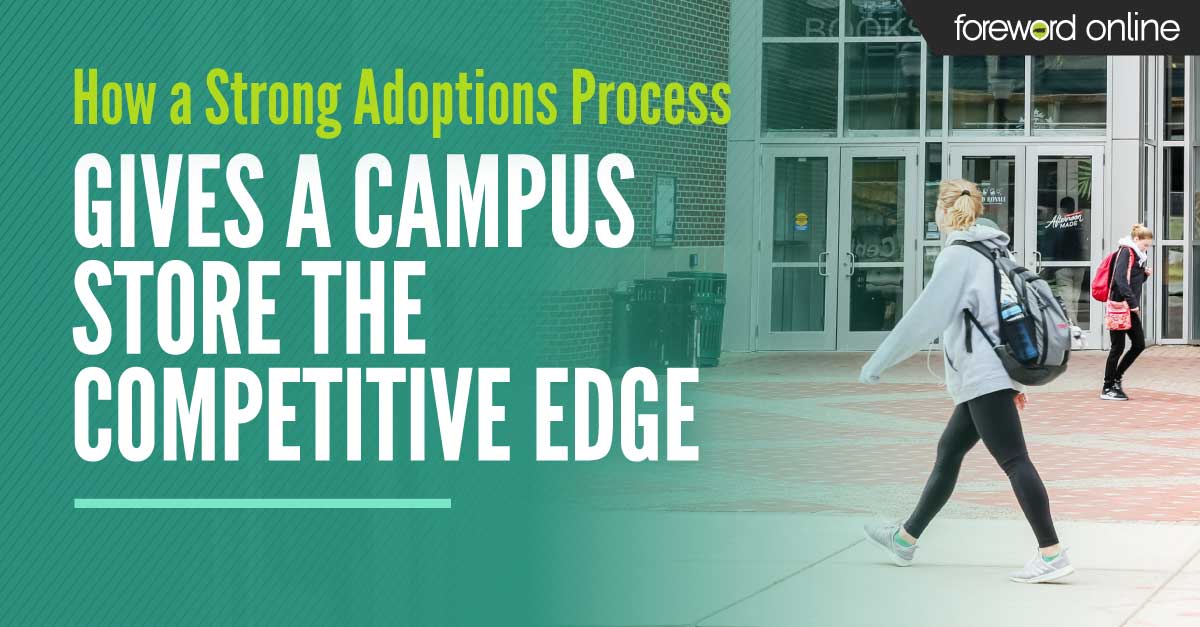Counting faculty members among a campus store’s target markets seems counterintuitive. College store professionals already work hard to coordinate faculty textbook adoptions. Without such efforts, fewer faculty and students would have essential educational materials. Why increase faculty engagement?
While it's true that campus stores should prioritize students, increasing faculty engagement has positive repercussions on students and many other university stakeholders — including campus store associates.
The Duck Store’s Alex Lyons pointed out the long-term payoff of increasing faculty engagement in her article for Foreword. The management’s efforts to develop and sustain a focused faculty message prompted more teachers to order required course materials through the Duck Store. Importantly, it also inspired them to place adoptions earlier. This boosted the store’s revenue and its ability to serve the entire University of Oregon community.
“ … We have established an amazing workflow,” she wrote. “Where there used to be a whirlwind of chaos around adoptions and rush, we now have confidence and clarity. That all feeds back to the faculty and, of course, the University of Oregon’s students.”
Snapshot: 3 Rewards of Increased Faculty Engagement
- Better adoptions rates
When faculty are engaged with the campus store mission, they’re likely to respond to adoption requests faster. - Better student service
When the rate of on-time adoptions gets a boost, store associates can focus on creating a superb customer experience. - Social influence
When teachers spread positive word of mouth about your store among students, administrators and colleagues, it furthers campus relevance.
Campus stores can view increasing faculty engagement through a teaching lens
There’s a truism that good college teachers often apply: If your students don’t know something you think they should, then it’s your job to teach them.
Sometimes students arrive in college with only a minimal grasp of essential skills like arithmetic, writing and college-level reading. Such students were probably underserved at their previous schools. College and university teachers don’t specialize in general education, and we can’t blame them for a new student’s bad experiences in the past. But does that mean they should ignore those who need general education skills? If teachers are interested in student learning, offering a correction to those experiences is their responsibility.
Good teachers strive to inspire students to choose learning. Sometimes that means helping them catch up with essential skills. Sometimes it means working hard to make lectures and discussions more engaging. Often, it means aiming to demonstrate how college learning can help students solve problems, face challenges and live more happily.
Campus stores can bring a similar perspective to relations with faculty members. You may know there are countless reasons why faculty should adopt course materials from the campus store — and in a timely fashion — but it’s still their choice.
Sometimes teachers in higher education might have had poor experiences with other collegiate retailers. Like underserved students, they might not have the knowledge they need to understand what your store can offer. Why not give them that knowledge?
If teachers don’t seem to know why or how your store helps them, teach them. Consider the possible rewards of an effort that works with even a percentage of faculty members.
3 great potentials of increasing faculty engagement with the campus store
- Better adoption rates
It hardly needs saying that campus store professionals experience fewer headaches when faculty communications run smoothly. On-time adoptions improve business, reduce organizational chaos and help students save money. If it seems like teachers on your campus don’t understand the campus store’s role in higher education and learning, that doesn’t mean they can’t learn. But it might mean they need a good teacher — like you.
- Better student service
Without the chaos that comes from late adoptions, campus stores can focus on student service. College students expect more from retailers now than ever before. They’re accustomed to shopping via multiple channels to find the best deals: in-store, directly through merchant websites and via social media. Campus stores must compete. Meanwhile, research shows that young people increasingly expect brick-and-mortar retailers to offer memorable experiences, including above-average service.
When adoption fulfillment runs smoothly, it’s much easier to help students navigate rush. Stores can offer more competitive textbook options and stock enough materials for every course without worrying about excess inventory. Campus stores can apply energy harnessed from the reduced stress to bolstering the kind of student service that gives them a competitive edge. What the store saves on resources devoted to adoption hassles, it can spend on creating memorable student-focused events and shopping experiences.
- Assured campus relevance
On some campuses, the bookstore is hallowed ground — an icon of scholarly tradition. Faculty speak with reverence about why they choose to adopt course materials through the campus store, and why students should feel honored to shop there. If that’s your campus, then you are already reaping the rewards of superb faculty relations.
If not, consider this: faculty are predisposed to respect excellent bookstores because they typically adore books. Most believe firmly in the power of the thoughtful written word to foster meaning in our lives and better our world.
For this reason, it’s nearly guaranteed that the faculty on your campus already cherish some of the products in your store. A collegiate retailer that builds on the devotion teachers have to books can win scores of evangelists. All management needs to do is teach the faculty that the store loves books, too.
When faculty understand how the campus store serves them by way of serving students — and books — they are likely to comply with early adoption requests much more readily. They’re also likely to spread positive messages about your store among students and administrators.
Our Faculty Communication Guide series continues with Part 4: Which Faculty Have the Greatest Impact on Campus Store Business?

.jpg?width=1200&name=Faculty-Communication-Guide3%20(1).jpg)




